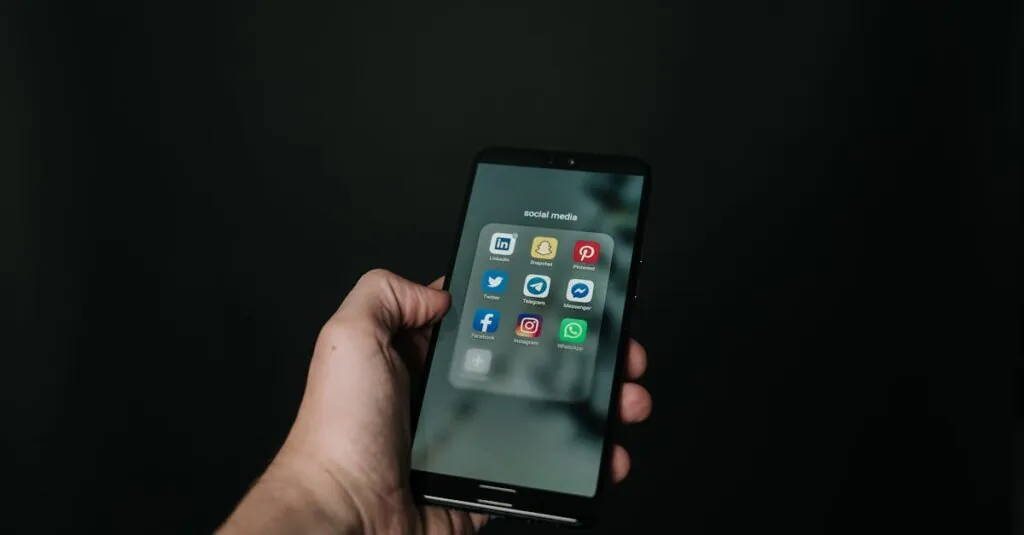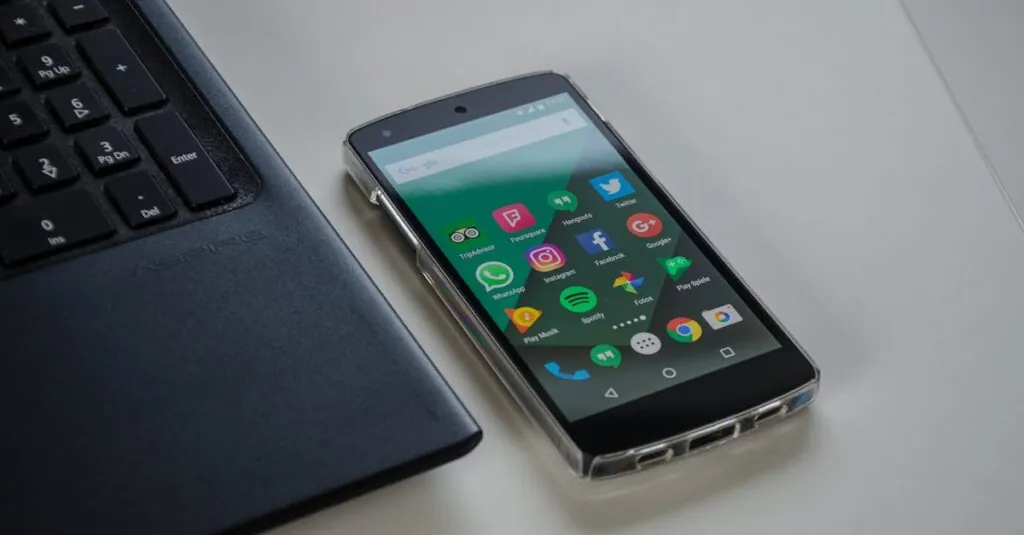Table of Contents
ToggleIn a world where pajamas can double as work attire and the office coffee machine is just a few steps to the kitchen, the remote work lifestyle has transformed how people approach their jobs. Gone are the days of battling traffic and enduring awkward small talk in the break room. Now, it’s all about maximizing productivity from the comfort of home—preferably while snacking on leftover pizza.
But don’t be fooled; remote work isn’t just about lounging on the couch with a laptop. It requires discipline, creativity, and a knack for dodging distractions (like that tempting Netflix binge). As more professionals embrace this flexible work style, the secrets to thriving in a remote environment are becoming clearer. Get ready to explore the ins and outs of this modern work revolution, where work-life balance isn’t just a buzzword but a daily reality.
Overview of Remote Work Lifestyle
Remote work lifestyle represents a significant shift in professional culture. Embracing flexibility allows individuals to design their work environment according to personal preferences. With the ability to set schedules, employees gain control over their time, fostering increased productivity.
Navigating this lifestyle involves both benefits and challenges. Reduced commuting times lead to more hours for personal activities, enhancing work-life balance. Some employees enjoy the comfort of home, which can increase satisfaction levels. However, challenges such as managing distractions and maintaining discipline can arise.
Many remote workers report feeling isolated, which highlights the importance of communication. Connecting with colleagues through video calls or messaging platforms supports collaboration and strengthens relationships. Establishing routines, including dedicated work hours, can help maintain focus and create boundaries.
To excel in remote work, individuals often need to set clear goals. Prioritizing tasks in a to-do list can facilitate organization and productivity. Utilizing tools like project management software helps keep everyone aligned on objectives.
Physical workspace also plays a crucial role. A designated home office area promotes focus and minimizes distractions, contributing to a more professional mindset. Investing in ergonomic furniture can further enhance comfort and productivity.
As the remote work lifestyle evolves, finding the right balance is essential. Each individual’s experience may vary, making it vital for professionals to adopt personalized strategies. Achieving success in this new environment often requires ongoing adjustments and proactive measures.
Benefits of Remote Work Lifestyle
Remote work provides several advantages that contribute to professional growth and personal satisfaction. Workers experience improved flexibility and increased productivity in their home office environments.
Flexibility in Schedule
Flexibility in schedule allows employees to tailor their work hours to fit personal commitments. Individuals can choose when to start and end their workday, which supports a better work-life balance. This autonomy leads to reduced stress and enhanced job satisfaction. Professionals often manage family responsibilities, pursue hobbies, or engage in exercise during the day, resulting in overall well-being. Companies benefit as satisfied employees typically demonstrate higher retention rates.
Increased Productivity
Increased productivity stands out as a hallmark of remote work. Without the distractions of a bustling office environment, individuals often find it easier to concentrate on tasks. Workers can design their workspaces to suit their preferences, leading to greater comfort. Additionally, many remote employees report fewer interruptions from colleagues. Utilizing productivity tools and techniques enables personnel to stay organized and meet deadlines effectively. Overall, the combination of a personalized workspace and focused time contributes significantly to improved output.
Challenges of Remote Work Lifestyle
The remote work lifestyle presents distinct challenges that can impact productivity and well-being.
Isolation and Loneliness
Isolation poses a significant challenge for remote workers. Many individuals miss the spontaneous conversations and camaraderie found in traditional office environments. Without daily interactions, feelings of loneliness can develop, affecting mental health. It’s essential for professionals to seek out social connections, whether through virtual meetings or networking events. Staying connected with colleagues fosters a sense of community and combats isolation. Additionally, joining online groups related to professional interests provides valuable interaction outside of work tasks.
Distractions at Home
Distractions at home can disrupt focus and productivity. Family members, pets, and household chores often compete for attention during work hours. Creating a designated workspace helps minimize these distractions significantly. Establishing clear boundaries with family members signals when work is in progress, reducing interruptions. Utilizing noise-canceling headphones or playing background music can enhance concentration in a busy environment. Maintaining a structured daily schedule also aids in minimizing distractions by promoting consistent work habits.
Tips for Thriving in a Remote Work Lifestyle
Creating a supportive environment is crucial for success in a remote work lifestyle. Implementing effective strategies enhances productivity and well-being.
Setting Up a Productive Workspace
Designing a dedicated workspace fosters focus and efficiency. A quiet room or corner minimizes distractions and helps maintain concentration. Choosing ergonomic furniture promotes comfort during long hours and can reduce physical strain. Personalized decorations can inspire motivation, turning the area into a space that feels uniquely theirs. Ensuring good lighting enhances mood and productivity, making it easier to stay alert. Keeping essential tools within reach prevents interruptions and promotes a smooth workflow.
Establishing Boundaries
Setting clear boundaries helps preserve work-life balance. Communicating availability to family members or roommates ensures respect for work hours. Creating a daily schedule enhances structure, allowing for designated breaks and personal time. Prioritizing tasks in a to-do list can clarify daily goals and prevent overlap between personal and professional responsibilities. Utilizing techniques like time blocking increases focus and productivity during work hours. Disconnecting from work outside set hours fosters mental clarity and reduces burnout.
The Future of Remote Work Lifestyle
Experts predict the remote work lifestyle will continue to evolve, shaping professional environments over the next decade. Companies are adopting flexible policies that support remote work, allowing employees to choose where they operate. Enhanced technology will play a crucial role, enabling seamless collaboration through advanced communication tools. Hybrid models are likely to emerge, combining in-office and remote work, leading to increased organizational adaptability.
Remote workers benefit from tailored schedules, improving personal and professional satisfaction. Employers are recognizing that flexibility boosts morale, directly impacting productivity. Increased reliance on productivity tools and techniques will help individuals stay organized and meet deadlines effectively. Adaptations in workspace design, including ergonomic furniture, will enhance comfort and efficiency.
Social connection remains integral to combatting feelings of isolation. Virtual meetups and digital networking will help strengthen relationships among remote teams. Individuals may find local co-working spaces appealing for in-person collaboration, blending the benefits of home and office environments.
As the remote work lifestyle expands, mental health and well-being will gain heightened emphasis. Organizations are likely to prioritize employee wellness by promoting work-life balance initiatives. Some may even offer resources for mental health support, recognizing its significance on performance.
Ultimately, continuous adaptation will define the future of remote work. Professionals must remain proactive and flexible in adjusting their strategies, guiding them toward a productive and fulfilling work experience.
The remote work lifestyle marks a significant shift in how individuals approach their professional lives. It offers unparalleled flexibility and the opportunity to create personalized work environments that cater to individual needs. While the advantages are clear, the challenges of isolation and distractions require proactive strategies to maintain productivity and well-being.
As professionals embrace this new way of working, the emphasis on communication, organization, and mental health will be crucial. By fostering connections and establishing boundaries, individuals can thrive in this evolving landscape. The future of remote work promises continued growth and adaptation, making it essential for everyone to stay informed and flexible in their approach.







